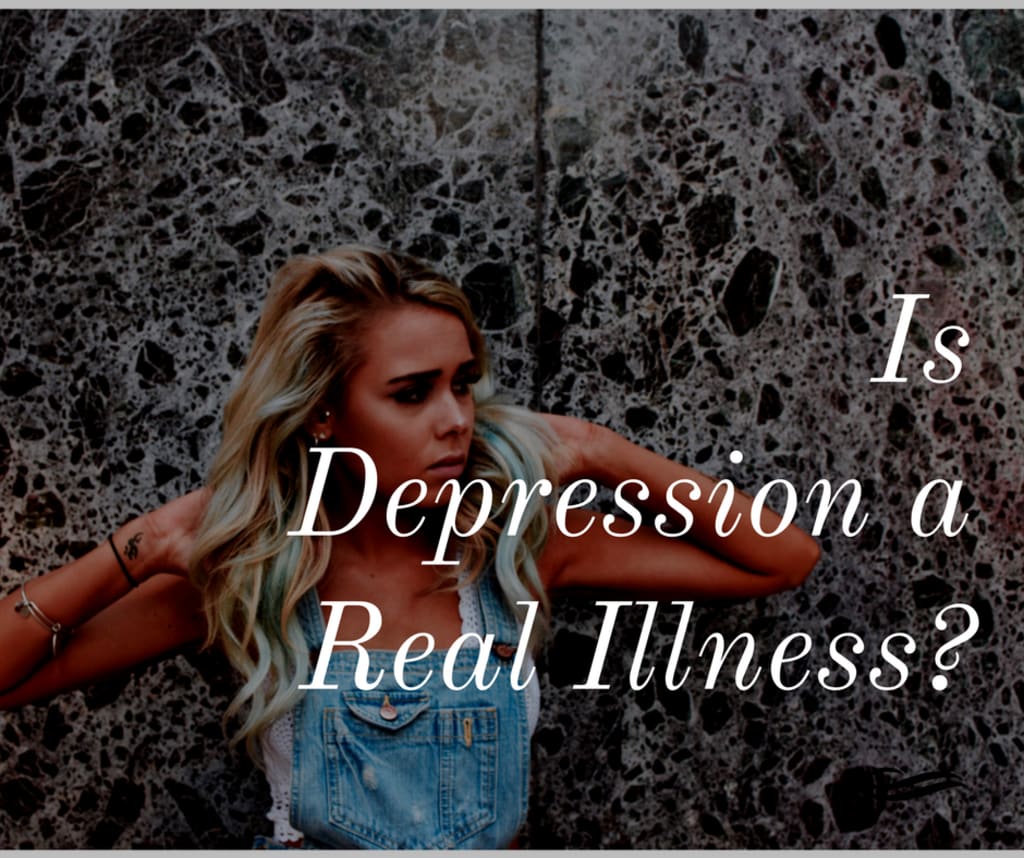Is Depression a Real Illness?
Spoiler alert: it is.

After tackling the beast called anxiety, I figured it's time to touch on yet another topic that I personally deal with and am highly fascinated by. (Yes, the brain is fascinating and even though I curse mine I am genuinely intrigued by its functioning—or lack thereof—ha.)
First of all, this article explains a lot of the research showing how real depression is as an actual illness. A key excerpt that I believe is vital for people to understand:
"Depression is, indeed, a culture-bound syndrome and at the same time it is a very terrible disease, which cannot and should not be equated with low or bad mood, sadness, or any other "aberration from the norm of happiness": it differs from these normal mental states symptomatically in the intensity of suffering experienced, in its character (such as resistance to distraction and other symptoms of the paralysis of the will, expressed among other things in the characteristic lack of motivation), and in its functional effects. An occasionally sad person is not dysfunctional, a depressed one is--depression destroys relationships and renders one incapable of performing one's duties, it is as real and serious a handicap as any physical one. Neither should depression be seen as an exaggeration of normal mental states, differing from them only quantitatively, or equated with normal reactions to particularly traumatic life events... As anyone who has experienced depression or observed closely persons suffering from depression knows, this absence of an external cause often leads the suffering individual to suspect oneself of madness."
Depression is a real and often lethal disease. Clinical depression affects not only mood and thoughts, but also the physical body. Individuals coping with depression have a higher level of stress hormones present in their bodies, and the brain scans of depression patients show decreased activity in some areas of the brain (1).
Being depressed is not simply having a case of the blues.
"Depressed" is not an adjective that should be thrown around lightly. Imagine if you complained to a cancer patient that you had a slight stuffy nose as they were unsure if they would be able to make it through the month alive. Now imagine you say "that's depressing" or "I just got really depressed for a sec" to someone who ACTUALLY struggles with severe depression. What a slap in the face.
As we've all heard before (yet most choose to ignore this wise advice) it is of no use to tell someone with depression that "it's all in your head," or "you should eat X and do Y workout," or "you're so miserable and negative to be around," or "you just need to think positive," ...the list goes on. (I've had some very invalidating and insulting remarks made while in a deep, deep state of suicidal depression. I'm not being overly sensitive—I will admit that I am quite the HSP and empath—but these remarks have cut me deep and only worsened the guilt which adds fuel to the depressive fire.)
So, no, being sad is not a legitimate medical illness but clinical depression most certainly is.
There are a wide array of symptoms that can present themselves when one is depressed. For the sake of not making this a laundry list, I will list the symptoms I have experienced:
- Persistent sad, anxious, or "empty" mood (the empty, numb, catatonic state is the scariest to me)
- Feelings of hopelessness & pessimism (as an otherwise optimistic person)
- Irritability (more than just typical teenage angst, or in my case... 22 yr-old angst?)
- Feelings of guilt, worthlessness, & helplessness (constantly... even when I'm doing somewhat okay)
- Loss of interest in just about everything (except puppies)
- Lack of energy; debilitating fatigue (I cannot even lift an arm or cry)
- Talking & moving very slowly (I'm talking like the sloth in Zootopia)
- Difficulty concentrating, remembering, making decisions (I have severe memory lapses... severe enough to freak out my family)
- Difficulty sleeping even though I'm exhausted OR sleeping 12+ hours a day (Nap queen)
- Lack of appetite (Not very fun when you have to eat recovery amounts of food)
- Thoughts of death or suicide, creating a suicide plan (these feel very impulsive and I can tell it is my brain malfunctioning when it gets this bad... I'm not a suicidal individual)
- Body aches, headaches, cramps, digestive problems (my GI disease worsens when I'm depressed)
- Inability to participate in life. At all. (And that's the kicker)
So why, even with all of those terrible symptoms of depression, are many individuals not recognizing it as a real disease? Why do so many poke fun at or downplay the seriousness of depression? Why are depressed individuals seen as lazy, dramatic, sensitive, dark, stupid... Why can we not call out of work depressed but a coworker can call in with a head cold? Why, with all of the information that we have on this terrible disease, is it still so misunderstood?
As I stated in part one of this series on mental illnesses, this lack of knowledge is simply a lack of experience. One cannot truly empathize with a sufferer unless they themselves have been through the experience. I can sympathize with someone who lost their husband in a car crash but I cannot empathize. My dad can sympathize that I am struggling with a chronic illness, autoimmune issues, and a wide array of mental illnesses but he cannot empathize. Our lack of experience can try to be replaced by studying and trying to understand these circumstances that we have not faced but ultimately it will never be enough. (But, that's not to say we shouldn't try to understand.)
Unless every person on this earth were to experience depression there will be no way to ultimately end the negative stigmas surrounding the disease. (And any mental illness, for that matter.) It's unfortunate, but it is also great. Because that means that the ignorance of those who don't understand is simply a byproduct of their privilege. It is a huge privilege to not have to battle mental illness every single second of every day. Heck, I'm jealous of that privilege! So yeah, sucks for us struggling but great for those who aren't!
The crux of this post is that depression is a very real illness and must be treated as such. I don't mean treated in the medical sense, (though medical and/or behavioral intervention is often crucial) but rather in the relational sense. If you are someone who has no personal experience with depression and someone in your life struggles with it, please know that you likely will not ever understand what they face on a daily basis. Try not to get frustrated with their apparent miserable attitude or laziness. Be patient with them when they flake on you or let you down. The battle that wages in their head is large enough without the guilt put on them by those they love. They are not trying to act this way.
I don't write all of this to make loved ones feel bad about their efforts. It takes a very patient, kind, understanding person to maintain a relationship with a depressed individual and I very much recognize that. I just know that most of the time, I wish those around me understood that I'm not acting this way because it's just who I am as a person. My heart is loving, motivated, kind, selfless, and happy. My brain, when in a depressive state, likes to act the complete opposite, try as I might to change it. But that is the nature of depression. It is truly one of the largest burdens I have had to deal with in my life. It's an illness, not a character trait. It's a disease, not a choice. It's the way my brain is currently responding to a chemical imbalance and the relationship between all of the little faulty neurons in there, not me trying to be a lazy, flaky, dark, miserable, hopeless human.
So, yes, depression is a real illness.





Comments
There are no comments for this story
Be the first to respond and start the conversation.